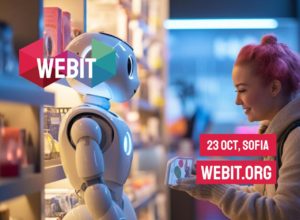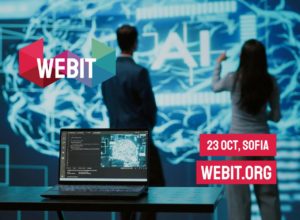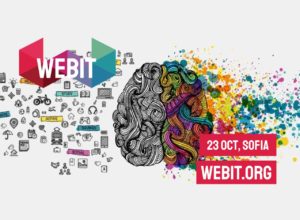Announcing the winners of the Founders Games 2025 Grand Finale in...
Davos, Switzerland – January 28, 2025
The Founders Games, the world’s premier global scaleup innovation competition, proudly unveiled the winners of its 2025 Grand Finale in Davos, Switzerland, coinciding with the week of the World Economic Forum in one of the highest cities of Europe.
This year’s competition saw over 4,800 applications from 150 countries, culminating in a rigorous evaluation process led by a panel of more than 400 top-tier late-stage venture capital investors. The Grand Finals started with a special invitation-only Davos style breakfast with the CEO of Binance, Richard Teng, Khosla Ventures’ Rajesh Swaminathan, Andrew NG (Coursera and AI Fund), Mercer’s Exec. Director Rich Nuzum, esteemed major family office representatives and HNWIs and other select global thought leaders and major financial allocators. The Grand Finale followed with a packed hall at theHilton in Davos.


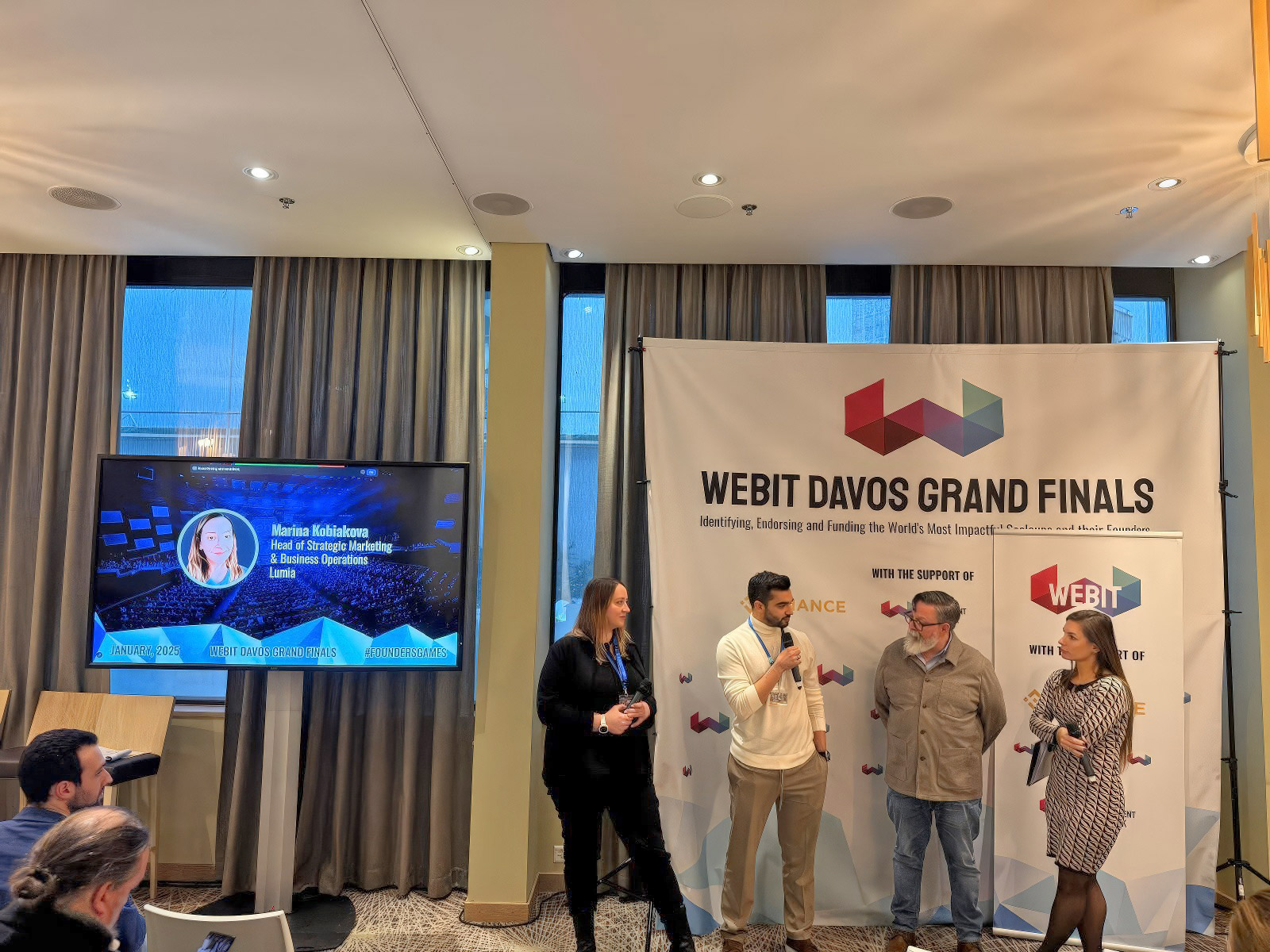

The Winners of Founders Games 2025 are:
- Quolab Technologies (United States) – A leader in defense and cybersecurity innovation, devoted to creating innovative solutions to big/complex data management, visualization, analysis and sharing challenges in the cybersecurity space.
- iLoF (United Kingdom) – a digital health company pioneering a breakthrough AI platform to accelerate the future of personalized drug discovery & development.
- Neodocs (India) – A cutting-edge AI and machine learning firm, YCombinator and Omidyar backed health-tech startup, founded by IIT Bombay alumni - Nikunj, Anurag and Pratik building instant, smartphone based tests that can be done anytime, anywhere - clinic, home, office, travel, hospital, etc.

The Finalists of the 2025 Grand Finale:
In addition to the winners, several exceptional companies made it to the Grand Finale and showcased their transformative innovations to over 400 leading investors and the Davos corporate community:- Expedock (Philippines) – A logistics disruptor, currently in Round A funding.
- QuSecure (United States) – A defense and cybersecurity innovator, in Round A funding.
- SOLAR MATERIALS GmbH (Germany) – A climate and planet tech leader, in Round A funding.
- Vispek (China) – A cutting-edge AI and machine learning enterprise, in Round B funding.
- Wareclouds (Chile) – A logistics disruptor, at the Seed funding stage.

The Legacy of the Founders Games
The Founders Games continues to serve as a powerful catalyst for scaling high-growth companies aligned with the United Nations Sustainable Development Goals (SDGs). Each year, it identifies and supports visionary founders building scalable, sustainable, and impactful businesses that contribute to a better future. The competition’s legacy is exemplified by CH4 Global and BeeHero, winners from the 2024 Founders Games, who were named among TIME Magazine’s Best Inventions of 2024 and Fast Company’s Top 4 Innovations. These companies have had a transformative impact on the future of humanity, advancing regenerative and sustainable development goals (SDGs) through their groundbreaking solutions. Their innovations not only address pressing challenges such as climate change and global food security but also pave the way for a more equitable, sustainable, and resilient future. Collectively, last year’s winners increased their consolidated revenues by 1.7x within 12 months, further demonstrating the exceptional caliber of companies selected through the Founders Games jury’s collective intelligence. The 2025 winners are expected to deliver similar transformative results, driving significant progress across industries and communities worldwide. The Founders games Davos Grand Finale was proudly sponsored by Binance, Lumia and Webit Investment Network.Join Us for the 2026 Founders Games
If you’re a scaleup seeking access to the world’s leading investors and global communities like COP and Davos, apply now for the Founders Games 2025 program. Don’t miss the opportunity to showcase your innovations at the Grand Finale in January 2026. For more information about the Founders Games, the finalists, and their groundbreaking work, visit www.FoundersGames.org. Media Contact: Svetoslava Boyadjieva | svetoslava@webit.orgThe Future of Sales and Customer Service: Leveraging AI Technologies
In an increasingly digital world, the integration of artificial intelligence (AI) technologies is transforming the landscape of sales and customer service. As businesses seek to enhance customer experiences and streamline operations, the adoption of AI tools is becoming essential. This article explores how AI is shaping the future of sales and customer service, the benefits it brings, and the tools that are making a significant impact.
 Join the discussion and learn from global leaders in the industry on the 23rd of October in Sofia. https://www.webit.org/festival-europe/index.php
#WebitFestival2024 is an exciting opportunity for industry leaders and experts to come together to discuss the latest trends and developments in the field of AI.
Check our ticket options here:
https://www.webit.org/festival-europe/tickets.php
Join the discussion and learn from global leaders in the industry on the 23rd of October in Sofia. https://www.webit.org/festival-europe/index.php
#WebitFestival2024 is an exciting opportunity for industry leaders and experts to come together to discuss the latest trends and developments in the field of AI.
Check our ticket options here:
https://www.webit.org/festival-europe/tickets.php
1. AI-Powered Customer Insights
AI technologies enable businesses to gather and analyze vast amounts of customer data. By employing machine learning algorithms, companies can gain deep insights into customer behaviors, preferences, and needs. Key Benefits:- Enhanced Understanding: AI helps organizations understand customer journeys, allowing for tailored marketing and sales strategies.
- Predictive Analytics: Businesses can forecast trends and customer demands, enabling proactive engagement.
2. Intelligent Chatbots and Virtual Assistants
AI-driven chatbots and virtual assistants are revolutionizing customer service by providing instant support. These tools can handle a variety of tasks, from answering queries to assisting with order placements, significantly enhancing the customer experience. Key Benefits:- 24/7 Support: Customers can receive assistance anytime, improving satisfaction and reducing wait times.
- Efficiency Boost: By automating routine inquiries, human agents can focus on more complex issues, enhancing productivity.
3. Personalization at Scale
AI enables businesses to deliver personalized experiences to customers by analyzing individual preferences and behaviors. This capability is crucial for both sales and customer service. Key Benefits:- Tailored Recommendations: AI can suggest products or services that align with customer interests, increasing the likelihood of conversion.
- Targeted Marketing: Personalized marketing campaigns lead to higher engagement rates and customer loyalty.
4. Sales Automation Tools
AI technologies are streamlining sales processes through automation. By automating tasks such as lead scoring, follow-ups, and data entry, sales teams can operate more efficiently. Key Benefits:- Increased Productivity: Sales representatives can devote more time to building relationships rather than managing administrative tasks.
- Better Lead Management: AI can prioritize leads based on conversion potential, helping teams focus their efforts effectively.
5. Voice Recognition and Natural Language Processing
AI-powered voice recognition and natural language processing (NLP) technologies are enhancing customer interactions. These tools allow customers to engage with businesses through voice commands, making the experience more intuitive. Key Benefits:- Enhanced Accessibility: Voice technology offers a convenient way for customers to interact, catering to diverse needs.
- Streamlined Communication: NLP can analyze customer sentiments, allowing businesses to respond more effectively to inquiries and feedback.
6. Ethical Considerations in AI Implementation
As AI becomes more integrated into sales and customer service, ethical considerations are paramount. Organizations must prioritize transparency, fairness, and data privacy to build customer trust. Key Considerations:- Data Security: Safeguarding customer data is crucial for maintaining trust and compliance.
- Bias Mitigation: It’s essential to ensure that AI algorithms are fair and unbiased, promoting equitable treatment for all customers.
Conclusion
The future of sales and customer service is being shaped by the strategic use of AI technologies. By leveraging AI tools, businesses can enhance customer experiences, streamline operations, and drive growth. However, success will depend on addressing ethical considerations and ensuring that AI enhances, rather than replaces, human connections. Join the discussion and learn from global leaders in the industry on the 23rd of October in Sofia. https://www.webit.org/festival-europe/index.php
#WebitFestival2024 is an exciting opportunity for industry leaders and experts to come together to discuss the latest trends and developments in the field of AI.
Check our ticket options here:
https://www.webit.org/festival-europe/tickets.php
Join the discussion and learn from global leaders in the industry on the 23rd of October in Sofia. https://www.webit.org/festival-europe/index.php
#WebitFestival2024 is an exciting opportunity for industry leaders and experts to come together to discuss the latest trends and developments in the field of AI.
Check our ticket options here:
https://www.webit.org/festival-europe/tickets.php The Evolution of Enterprise-Scale Human-AI Teams
As businesses increasingly integrate artificial intelligence (AI) into their operations, the concept of human-AI collaboration is evolving into a crucial aspect of enterprise strategy. This article explores the journey of enterprise-scale human-AI teams, highlighting their development, current state, and future potential.
 Join the discussion and learn from global leaders in the industry on the 23rd of October in Sofia. https://www.webit.org/festival-europe/index.php
#WebitFestival2024 is an exciting opportunity for industry leaders and experts to come together to discuss the latest trends and developments in the field of AI.
Check our ticket options here:
https://www.webit.org/festival-europe/tickets.php
Join the discussion and learn from global leaders in the industry on the 23rd of October in Sofia. https://www.webit.org/festival-europe/index.php
#WebitFestival2024 is an exciting opportunity for industry leaders and experts to come together to discuss the latest trends and developments in the field of AI.
Check our ticket options here:
https://www.webit.org/festival-europe/tickets.php
1. The Early Days: Automation and Task Execution
In the early stages of AI adoption, the primary focus was on automation. Enterprises leveraged AI to perform repetitive tasks, such as data entry, customer service inquiries, and inventory management. These systems were largely rule-based, executing predefined tasks without any real understanding or adaptability. Key Features:- Efficiency Gains: Businesses experienced significant improvements in operational efficiency.
- Cost Reduction: Automation reduced labor costs and minimized human error.
- Limited Interaction: The relationship between humans and AI was primarily transactional.
2. The Emergence of Collaborative Intelligence
As AI technology matured, the focus shifted from mere task execution to collaborative intelligence. Enterprises began to realize that AI could enhance human capabilities rather than replace them. This led to the formation of teams where humans and AI worked together to achieve common goals. Key Features:- Augmented Decision-Making: AI systems began providing data-driven insights, allowing humans to make better-informed decisions.
- Enhanced Creativity: AI tools supported creative processes, enabling teams to explore new ideas and solutions.
- Skill Development: Workers started acquiring new skills to work effectively alongside AI systems.
3. Integration into Business Processes
Today, AI has become deeply integrated into various business processes. Human-AI teams are now commonplace in areas such as marketing, finance, and supply chain management. These teams leverage AI not just for data analysis but also for predictive modeling, trend analysis, and strategic planning. Key Features:- Cross-Functional Teams: AI specialists work alongside domain experts, fostering diverse skill sets.
- Real-Time Collaboration: AI tools provide real-time data, facilitating quick decision-making.
- Continuous Learning: AI systems are designed to learn from interactions, improving their performance over time.
4. Challenges in Human-AI Team Dynamics
Despite the benefits, integrating human and AI capabilities poses several challenges. Issues such as trust, transparency, and ethical considerations are critical in ensuring effective collaboration. Key Challenges:- Trust in AI: Employees may be hesitant to rely on AI-generated insights, especially in high-stakes scenarios.
- Transparency: Understanding how AI arrives at its conclusions is essential for fostering trust.
- Job Displacement Concerns: The fear of job loss due to automation can hinder the acceptance of AI in the workplace.
5. The Future: Evolving Roles and Responsibilities
Looking ahead, the landscape of human-AI collaboration is set to evolve further. As AI becomes more sophisticated, the roles within human-AI teams will likely change, emphasizing strategic oversight rather than operational execution. Future Trends:- AI as a Partner: AI systems will be viewed as collaborative partners, enhancing human capabilities rather than replacing them.
- Focus on Emotional Intelligence: As routine tasks become automated, skills such as empathy, creativity, and critical thinking will become increasingly valuable.
- Ethical AI Frameworks: Enterprises will prioritize ethical considerations, ensuring that AI usage aligns with societal values.
Conclusion
The evolution of enterprise-scale human-AI teams represents a significant shift in how organizations operate. From basic automation to collaborative intelligence, these teams are redefining productivity and innovation. As we look to the future, the successful integration of human and AI capabilities will depend on addressing challenges and fostering an environment of trust and transparency. Embracing this partnership will be key to unlocking the full potential of AI in the enterprise landscape. Join the discussion and learn from global leaders in the industry on the 23rd of October in Sofia. https://www.webit.org/festival-europe/index.php
#WebitFestival2024 is an exciting opportunity for industry leaders and experts to come together to discuss the latest trends and developments in the field of AI.
Check our ticket options here:
https://www.webit.org/festival-europe/tickets.php
Join the discussion and learn from global leaders in the industry on the 23rd of October in Sofia. https://www.webit.org/festival-europe/index.php
#WebitFestival2024 is an exciting opportunity for industry leaders and experts to come together to discuss the latest trends and developments in the field of AI.
Check our ticket options here:
https://www.webit.org/festival-europe/tickets.php We’re excited to announce that Raj Timothy Nandwani, Global Business Development...
🌟 Exciting Update! 🌟
We’re excited to announce that Raj Timothy Nandwani, Global Business Development Lead at Binance, will be speaking at Webit 2024 Edition! 🎤✨
Raj is a driving force in the cryptocurrency world, known for turning complex ideas into actionable strategies that unlock commercial success. With over a decade of experience, Raj has been pivotal in guiding high-performing teams, establishing top-tier partnerships, and nurturing innovative startups in the global crypto and financial sectors.
As a leader at Binance, Raj is shaping the future of digital assets, expanding Web3 technologies, and advancing strategic partnerships and investments. His session will provide key insights into the future of crypto and how Binance is revolutionizing digital finance and blockchain technology.
Don’t miss the chance to hear from one of the key players transforming the global crypto landscape! 🚀💡
https://www.webit.org/festival-europe/index.php
#Webit #CryptoInnovation #BlockchainTechnology #Web3 #DigitalAssets #Binance #RajNandwani #FutureOfFinance #Webit2024 #CryptoLeadership
The Future of Mental Health: Innovations and Shifts in Care
Mental health, once a topic shrouded in stigma, is now at the forefront of global health discussions. As awareness grows, the mental health landscape is undergoing transformative changes, driven by advances in technology, changing societal attitudes, and a growing recognition of its importance. The future of mental health care promises a more personalized, accessible, and effective approach to addressing psychological well-being. Here’s how the landscape is evolving and what we can expect in the coming years.
 Join the discussion and learn from global leaders in the industry on the 23rd of October in Sofia. https://www.webit.org/festival-europe/index.php
#WebitFestival2024 is an exciting opportunity for industry leaders and experts to come together to discuss the latest trends and developments in the field of mental health in the future.
Check our ticket options here:
https://www.webit.org/festival-europe/tickets.php
Join the discussion and learn from global leaders in the industry on the 23rd of October in Sofia. https://www.webit.org/festival-europe/index.php
#WebitFestival2024 is an exciting opportunity for industry leaders and experts to come together to discuss the latest trends and developments in the field of mental health in the future.
Check our ticket options here:
https://www.webit.org/festival-europe/tickets.php
1. Technology-Driven Mental Health Solutions
The rise of technology is revolutionizing mental health care. Digital tools, such as mobile apps, teletherapy platforms, and artificial intelligence (AI), are making mental health services more accessible than ever. These innovations are helping break down traditional barriers to care, such as geographic limitations and long waiting times, while offering new ways for individuals to manage their mental well-being. Mobile apps like Calm and Headspace are popularizing mindfulness and meditation practices, while therapy apps such as BetterHelp and Talkspace provide access to licensed professionals from the comfort of home. AI-driven chatbots like Woebot are offering 24/7 mental health support, using cognitive-behavioral therapy (CBT) techniques to assist users in managing stress, anxiety, and depression. In the future, AI is expected to play a more significant role in mental health care by analyzing data to predict mental health conditions and personalize treatment plans. This could lead to earlier diagnosis and intervention, potentially preventing the escalation of mental health issues.2. Personalized Mental Health Care
The future of mental health will see a shift toward more personalized treatment options, driven by advancements in genetics, neuroscience, and data analytics. Researchers are increasingly understanding that mental health conditions like depression, anxiety, and bipolar disorder are not one-size-fits-all. As a result, treatments will be tailored to each individual's unique genetic makeup, brain chemistry, and environmental factors. Pharmacogenetics, the study of how genes affect a person’s response to drugs, is a growing field that will allow clinicians to prescribe medications based on an individual’s genetic profile. This means fewer side effects, faster-acting treatments, and overall more effective mental health care. Additionally, breakthroughs in neuroimaging and brain mapping are helping scientists better understand the brain’s function in relation to mental health disorders. This knowledge is paving the way for more precise and personalized interventions, such as targeted brain stimulation therapies.3. Teletherapy and Remote Care
Teletherapy—providing therapy services via video, phone, or online messaging—has seen a dramatic rise, particularly since the COVID-19 pandemic. This trend is expected to continue as remote care becomes a standard practice in the mental health field. Teletherapy offers numerous benefits, including increased access to care for individuals in rural or underserved areas, greater flexibility in scheduling, and the ability to maintain continuity of care during times of crisis. As digital tools become more advanced, virtual reality (VR) and augmented reality (AR) are being explored as immersive therapy options, particularly for treating anxiety, PTSD, and phobias. In the future, mental health professionals will likely integrate remote care with in-person services to provide a hybrid model of therapy, catering to patients’ diverse needs and preferences.4. Workplace Mental Health
Mental health is increasingly being recognized as a critical component of workplace well-being. Employers are beginning to prioritize the mental health of their employees, understanding that a mentally healthy workforce is more productive, engaged, and resilient. In response to this growing awareness, companies are implementing mental health programs that include counseling services, stress management workshops, and mental health days. Some are even incorporating mental health assessments into routine employee check-ins, allowing them to address potential issues before they escalate. The future of mental health in the workplace will likely see a greater integration of mental health resources into employee benefits packages, as well as increased support for creating mentally healthy work environments. By fostering open conversations about mental health and reducing the stigma associated with seeking help, employers can play a crucial role in supporting the overall well-being of their teams.5. Holistic Approaches to Mental Health
The future of mental health care is moving beyond traditional therapy and medication to embrace more holistic approaches. These include lifestyle interventions such as diet, exercise, sleep, and mindfulness practices, which are increasingly recognized as important contributors to mental well-being. For example, nutrition and gut health are now being studied for their links to mental health, with research suggesting that a balanced diet rich in nutrients can help alleviate symptoms of depression and anxiety. Similarly, physical exercise is being widely prescribed as a form of mental health care, as it has been shown to reduce stress and improve mood. Mindfulness and meditation practices are also being integrated into mainstream mental health care, with a growing body of evidence supporting their effectiveness in reducing symptoms of anxiety, depression, and stress. This trend is leading to a more holistic, preventive approach to mental health, emphasizing the importance of self-care and overall wellness.6. Breaking the Stigma
While significant progress has been made in destigmatizing mental health, there is still much work to be done. However, the future looks promising, with younger generations leading the charge in openly discussing mental health issues and seeking help when needed. Public figures, celebrities, and athletes speaking candidly about their own mental health struggles are helping to normalize these conversations, making it easier for others to seek support without fear of judgment. As the stigma continues to erode, mental health care will become more widely accepted and accessible. Education will also play a key role in the future of mental health. Schools, workplaces, and communities will increasingly focus on mental health literacy, teaching people how to recognize early signs of mental illness, practice self-care, and seek professional help when necessary. The result will be a more informed and supportive society that prioritizes mental well-being.7. Proactive and Preventive Mental Health Care
In the future, mental health care will shift from being reactive—treating issues once they arise—to being more proactive and preventive. This means identifying risk factors for mental health conditions early and intervening before they develop into more serious problems. Technologies like wearable devices and mental health apps will enable individuals to monitor their mental well-being in real time, tracking mood, sleep patterns, and stress levels. This data can provide valuable insights into a person’s mental state and trigger early interventions, such as therapy or lifestyle changes. Governments and health organizations are also increasingly investing in preventive mental health care initiatives, such as community mental health programs, school-based mental health education, and public awareness campaigns. By focusing on prevention, we can reduce the prevalence of mental health disorders and improve overall well-being.Conclusion: A Brighter Future for Mental Health
The future of mental health care is one of innovation, accessibility, and personalized care. Technological advancements, shifting societal attitudes, and a growing focus on holistic well-being are reshaping the way we approach mental health, making it easier for people to seek help and manage their mental health proactively. As we move forward, the integration of digital tools, personalized treatments, and preventive strategies will ensure that mental health care is more effective and inclusive than ever before. The path ahead promises a brighter future, where mental health is given the priority it deserves, empowering individuals to lead healthier, happier lives. Join the discussion and learn from global leaders in the industry on the 23rd of October in Sofia. https://www.webit.org/festival-europe/index.php
#WebitFestival2024 is an exciting opportunity for industry leaders and experts to come together to discuss the latest trends and developments in the field of mental health in the future.
Check our ticket options here:
https://www.webit.org/festival-europe/tickets.php
Join the discussion and learn from global leaders in the industry on the 23rd of October in Sofia. https://www.webit.org/festival-europe/index.php
#WebitFestival2024 is an exciting opportunity for industry leaders and experts to come together to discuss the latest trends and developments in the field of mental health in the future.
Check our ticket options here:
https://www.webit.org/festival-europe/tickets.php We’re pleased to share that Nikolaz Foucaud, Managing Director for EMEA...
We’re pleased to share that Nikolaz Foucaud, Managing Director for EMEA at Coursera, will be speaking at Webit Sofia Edition 2024! 🎤✨
As the driving force behind Coursera’s growth in Europe, the Middle East, and Africa—home to over 40 million learners and 2,000 institutions—Nikolaz is shaping the future of education in this vital region. With more than 20 years of experience, including leadership roles at NetApp and Microsoft, Nikolaz brings unmatched expertise in scaling businesses and driving innovation.
At Webit 2024,Edition, he will share his insights on the future of online education and how Coursera is transforming learning across the globe, from consumer education to degree programs and enterprise solutions.
Don't miss the chance to hear from one of the leaders shaping the global landscape of digital learning! 🌍📚
Secure your spot now:
https://www.webit.org/festival-europe/tickets.php
#OnlineEducation #DigitalLearning #EdTech #Coursera #NikolazFoucaud #FutureOfLearning #InnovationInEducation #Webit2024 #EMEAGrowth
How Businesses Are Paving the Way for a Greener Economy
In the face of growing environmental challenges, from climate change to resource depletion, the business world has begun shifting toward sustainability. Companies worldwide are realizing the necessity and potential profitability of operating in ways that minimize their environmental impact. This movement is driving the emergence of a greener economy, one in which sustainability and business growth go hand in hand. Here’s how businesses are leading the charge toward a more environmentally conscious future.
 Many companies are embedding sustainability into their core strategies. Instead of treating environmental initiatives as side projects, businesses are now integrating sustainable practices into everything from supply chain management to product design. Major corporations such as Unilever, Patagonia, and IKEA have set bold sustainability goals—ranging from achieving net-zero emissions to using only renewable materials.
This strategic shift often includes setting science-based targets for reducing greenhouse gas emissions, improving water efficiency, and decreasing waste. By aligning their business models with environmental sustainability, these companies are not only reducing their ecological footprints but also future-proofing their operations in a world with increasing regulatory pressure and resource scarcity.
Many companies are embedding sustainability into their core strategies. Instead of treating environmental initiatives as side projects, businesses are now integrating sustainable practices into everything from supply chain management to product design. Major corporations such as Unilever, Patagonia, and IKEA have set bold sustainability goals—ranging from achieving net-zero emissions to using only renewable materials.
This strategic shift often includes setting science-based targets for reducing greenhouse gas emissions, improving water efficiency, and decreasing waste. By aligning their business models with environmental sustainability, these companies are not only reducing their ecological footprints but also future-proofing their operations in a world with increasing regulatory pressure and resource scarcity.
 The global energy landscape is rapidly changing, and businesses are playing a critical role in the transition to renewable energy. Tech giants like Google and Amazon have committed to powering their operations with 100% renewable energy, either through direct investment in renewable energy projects or by purchasing renewable energy credits.
This shift is driven by a combination of factors, including the falling costs of solar and wind energy, growing consumer demand for environmentally responsible companies, and government incentives for clean energy. By adopting renewable energy, businesses are cutting down on their carbon footprints while also gaining a competitive edge in a world where environmental awareness is rising.
The global energy landscape is rapidly changing, and businesses are playing a critical role in the transition to renewable energy. Tech giants like Google and Amazon have committed to powering their operations with 100% renewable energy, either through direct investment in renewable energy projects or by purchasing renewable energy credits.
This shift is driven by a combination of factors, including the falling costs of solar and wind energy, growing consumer demand for environmentally responsible companies, and government incentives for clean energy. By adopting renewable energy, businesses are cutting down on their carbon footprints while also gaining a competitive edge in a world where environmental awareness is rising.
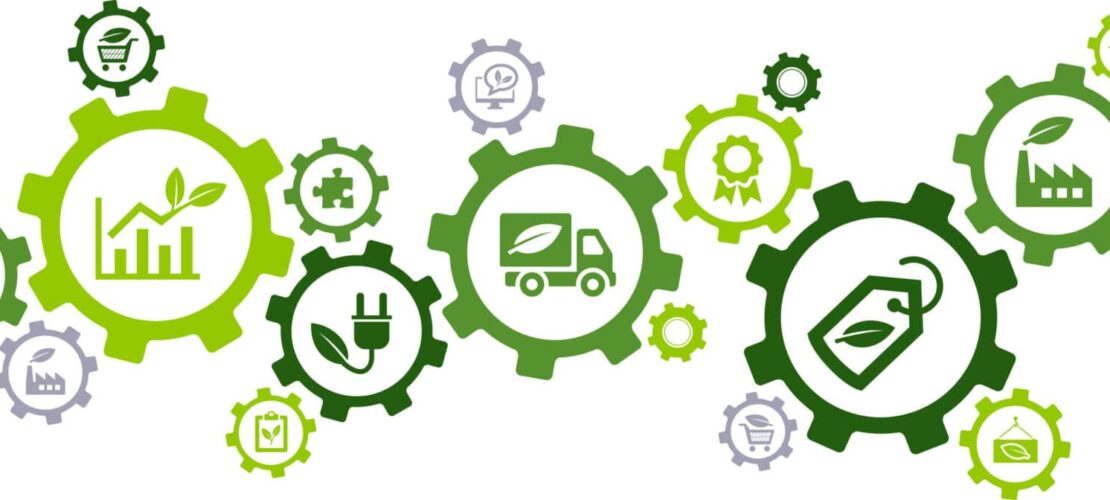 Sustainability doesn't stop at a company's own operations; it extends throughout the entire supply chain. Businesses are increasingly scrutinizing their suppliers to ensure that they adhere to environmental and social standards, fostering greener supply chains.
For instance, companies in the fashion industry are collaborating with eco-friendly textile manufacturers, while food companies are seeking out sustainable agriculture practices. Some are also partnering with local suppliers to reduce transportation-related emissions and promote local economies.
Furthermore, businesses are using blockchain technology to enhance supply chain transparency. This innovation allows companies to track products from the source to the consumer, ensuring that environmental standards are maintained throughout the production process.
Sustainability doesn't stop at a company's own operations; it extends throughout the entire supply chain. Businesses are increasingly scrutinizing their suppliers to ensure that they adhere to environmental and social standards, fostering greener supply chains.
For instance, companies in the fashion industry are collaborating with eco-friendly textile manufacturers, while food companies are seeking out sustainable agriculture practices. Some are also partnering with local suppliers to reduce transportation-related emissions and promote local economies.
Furthermore, businesses are using blockchain technology to enhance supply chain transparency. This innovation allows companies to track products from the source to the consumer, ensuring that environmental standards are maintained throughout the production process.
 The linear "take-make-dispose" model of production is rapidly being replaced by circular economy models, which focus on keeping resources in use for as long as possible. Businesses are increasingly embracing circularity to reduce waste, lower costs, and support long-term environmental sustainability.
For example, Apple has made significant strides in developing closed-loop supply chains by recovering valuable materials from old devices to create new ones. Similarly, companies like Adidas have launched programs to collect and recycle used products, turning waste into new, high-quality goods.
By promoting circularity, businesses are not only helping to conserve resources but also gaining new opportunities for innovation and value creation.
The linear "take-make-dispose" model of production is rapidly being replaced by circular economy models, which focus on keeping resources in use for as long as possible. Businesses are increasingly embracing circularity to reduce waste, lower costs, and support long-term environmental sustainability.
For example, Apple has made significant strides in developing closed-loop supply chains by recovering valuable materials from old devices to create new ones. Similarly, companies like Adidas have launched programs to collect and recycle used products, turning waste into new, high-quality goods.
By promoting circularity, businesses are not only helping to conserve resources but also gaining new opportunities for innovation and value creation.
 The financial sector is also a crucial player in the shift toward a greener economy. Green bonds, sustainable investing, and climate-related financial disclosures are becoming more common as investors seek out environmentally responsible opportunities.
Many businesses are now tapping into green finance to fund renewable energy projects, energy efficiency upgrades, and other sustainability initiatives. Banks and financial institutions are also aligning their lending practices with environmental goals by offering preferential loan terms to companies with strong sustainability credentials.
This growing interest in green financing is accelerating the transition to a low-carbon economy by making it easier for businesses to access the capital they need to implement sustainability projects.
The financial sector is also a crucial player in the shift toward a greener economy. Green bonds, sustainable investing, and climate-related financial disclosures are becoming more common as investors seek out environmentally responsible opportunities.
Many businesses are now tapping into green finance to fund renewable energy projects, energy efficiency upgrades, and other sustainability initiatives. Banks and financial institutions are also aligning their lending practices with environmental goals by offering preferential loan terms to companies with strong sustainability credentials.
This growing interest in green financing is accelerating the transition to a low-carbon economy by making it easier for businesses to access the capital they need to implement sustainability projects.
 Consumer behavior is another key factor driving the shift toward a greener economy. As awareness of environmental issues grows, customers are increasingly seeking out products and services from companies that prioritize sustainability. Brands that can demonstrate their environmental commitment are gaining a competitive advantage, while those that fail to address sustainability are at risk of losing market share.
This shift in consumer expectations has led many businesses to adopt more transparent practices. Companies are now offering environmental impact reports, carbon labels on products, and clearer information on sourcing and production processes. This transparency not only builds consumer trust but also pressures competitors to follow suit, creating a ripple effect throughout entire industries.
Consumer behavior is another key factor driving the shift toward a greener economy. As awareness of environmental issues grows, customers are increasingly seeking out products and services from companies that prioritize sustainability. Brands that can demonstrate their environmental commitment are gaining a competitive advantage, while those that fail to address sustainability are at risk of losing market share.
This shift in consumer expectations has led many businesses to adopt more transparent practices. Companies are now offering environmental impact reports, carbon labels on products, and clearer information on sourcing and production processes. This transparency not only builds consumer trust but also pressures competitors to follow suit, creating a ripple effect throughout entire industries.
 In addition to individual business efforts, collaboration between businesses, governments, and non-governmental organizations (NGOs) is essential to creating a sustainable economy. Public-private partnerships are facilitating the development of green infrastructure, such as energy-efficient buildings and low-emission transportation systems.
For instance, government programs that support renewable energy development are being bolstered by corporate investments, accelerating the deployment of clean technologies. Similarly, partnerships with NGOs are helping businesses address environmental challenges that require collective action, such as ocean plastic pollution and deforestation.
These collaborations are essential in creating an enabling environment for sustainable business practices, allowing companies to scale up their environmental efforts and make a more significant impact.
In addition to individual business efforts, collaboration between businesses, governments, and non-governmental organizations (NGOs) is essential to creating a sustainable economy. Public-private partnerships are facilitating the development of green infrastructure, such as energy-efficient buildings and low-emission transportation systems.
For instance, government programs that support renewable energy development are being bolstered by corporate investments, accelerating the deployment of clean technologies. Similarly, partnerships with NGOs are helping businesses address environmental challenges that require collective action, such as ocean plastic pollution and deforestation.
These collaborations are essential in creating an enabling environment for sustainable business practices, allowing companies to scale up their environmental efforts and make a more significant impact.
 Join the discussion and learn from global leaders in the industry on the 23rd of October in Sofia. https://www.webit.org/festival-europe/index.php
#WebitFestival2024 is an exciting opportunity for industry leaders and experts to come together to discuss the latest trends and developments in the field of sustainability in the future.
Check our ticket options here:
https://www.webit.org/festival-europe/tickets.php
Join the discussion and learn from global leaders in the industry on the 23rd of October in Sofia. https://www.webit.org/festival-europe/index.php
#WebitFestival2024 is an exciting opportunity for industry leaders and experts to come together to discuss the latest trends and developments in the field of sustainability in the future.
Check our ticket options here:
https://www.webit.org/festival-europe/tickets.php
1. Corporate Sustainability Strategies
 Many companies are embedding sustainability into their core strategies. Instead of treating environmental initiatives as side projects, businesses are now integrating sustainable practices into everything from supply chain management to product design. Major corporations such as Unilever, Patagonia, and IKEA have set bold sustainability goals—ranging from achieving net-zero emissions to using only renewable materials.
This strategic shift often includes setting science-based targets for reducing greenhouse gas emissions, improving water efficiency, and decreasing waste. By aligning their business models with environmental sustainability, these companies are not only reducing their ecological footprints but also future-proofing their operations in a world with increasing regulatory pressure and resource scarcity.
Many companies are embedding sustainability into their core strategies. Instead of treating environmental initiatives as side projects, businesses are now integrating sustainable practices into everything from supply chain management to product design. Major corporations such as Unilever, Patagonia, and IKEA have set bold sustainability goals—ranging from achieving net-zero emissions to using only renewable materials.
This strategic shift often includes setting science-based targets for reducing greenhouse gas emissions, improving water efficiency, and decreasing waste. By aligning their business models with environmental sustainability, these companies are not only reducing their ecological footprints but also future-proofing their operations in a world with increasing regulatory pressure and resource scarcity.
2. Embracing Renewable Energy
 The global energy landscape is rapidly changing, and businesses are playing a critical role in the transition to renewable energy. Tech giants like Google and Amazon have committed to powering their operations with 100% renewable energy, either through direct investment in renewable energy projects or by purchasing renewable energy credits.
This shift is driven by a combination of factors, including the falling costs of solar and wind energy, growing consumer demand for environmentally responsible companies, and government incentives for clean energy. By adopting renewable energy, businesses are cutting down on their carbon footprints while also gaining a competitive edge in a world where environmental awareness is rising.
The global energy landscape is rapidly changing, and businesses are playing a critical role in the transition to renewable energy. Tech giants like Google and Amazon have committed to powering their operations with 100% renewable energy, either through direct investment in renewable energy projects or by purchasing renewable energy credits.
This shift is driven by a combination of factors, including the falling costs of solar and wind energy, growing consumer demand for environmentally responsible companies, and government incentives for clean energy. By adopting renewable energy, businesses are cutting down on their carbon footprints while also gaining a competitive edge in a world where environmental awareness is rising.
3. Innovative Product Development
A critical aspect of building a greener economy involves developing products and services that minimize environmental harm. Businesses are increasingly designing products with the entire lifecycle in mind, focusing on reducing the environmental impact from production to disposal. For example, Tesla is revolutionizing the automotive industry by creating electric vehicles (EVs) that run on clean energy instead of fossil fuels. Similarly, many companies are adopting circular economy principles, designing products that can be easily repaired, reused, or recycled, thereby reducing waste and promoting resource efficiency. Packaging innovation is another area where businesses are making strides. Biodegradable, recyclable, and reusable packaging options are replacing traditional single-use plastics, contributing to waste reduction and addressing one of the planet’s most pressing environmental issues.4. Sustainable Supply Chains
 Sustainability doesn't stop at a company's own operations; it extends throughout the entire supply chain. Businesses are increasingly scrutinizing their suppliers to ensure that they adhere to environmental and social standards, fostering greener supply chains.
For instance, companies in the fashion industry are collaborating with eco-friendly textile manufacturers, while food companies are seeking out sustainable agriculture practices. Some are also partnering with local suppliers to reduce transportation-related emissions and promote local economies.
Furthermore, businesses are using blockchain technology to enhance supply chain transparency. This innovation allows companies to track products from the source to the consumer, ensuring that environmental standards are maintained throughout the production process.
Sustainability doesn't stop at a company's own operations; it extends throughout the entire supply chain. Businesses are increasingly scrutinizing their suppliers to ensure that they adhere to environmental and social standards, fostering greener supply chains.
For instance, companies in the fashion industry are collaborating with eco-friendly textile manufacturers, while food companies are seeking out sustainable agriculture practices. Some are also partnering with local suppliers to reduce transportation-related emissions and promote local economies.
Furthermore, businesses are using blockchain technology to enhance supply chain transparency. This innovation allows companies to track products from the source to the consumer, ensuring that environmental standards are maintained throughout the production process.
5. Circular Economy Models
 The linear "take-make-dispose" model of production is rapidly being replaced by circular economy models, which focus on keeping resources in use for as long as possible. Businesses are increasingly embracing circularity to reduce waste, lower costs, and support long-term environmental sustainability.
For example, Apple has made significant strides in developing closed-loop supply chains by recovering valuable materials from old devices to create new ones. Similarly, companies like Adidas have launched programs to collect and recycle used products, turning waste into new, high-quality goods.
By promoting circularity, businesses are not only helping to conserve resources but also gaining new opportunities for innovation and value creation.
The linear "take-make-dispose" model of production is rapidly being replaced by circular economy models, which focus on keeping resources in use for as long as possible. Businesses are increasingly embracing circularity to reduce waste, lower costs, and support long-term environmental sustainability.
For example, Apple has made significant strides in developing closed-loop supply chains by recovering valuable materials from old devices to create new ones. Similarly, companies like Adidas have launched programs to collect and recycle used products, turning waste into new, high-quality goods.
By promoting circularity, businesses are not only helping to conserve resources but also gaining new opportunities for innovation and value creation.
6. Green Financing
 The financial sector is also a crucial player in the shift toward a greener economy. Green bonds, sustainable investing, and climate-related financial disclosures are becoming more common as investors seek out environmentally responsible opportunities.
Many businesses are now tapping into green finance to fund renewable energy projects, energy efficiency upgrades, and other sustainability initiatives. Banks and financial institutions are also aligning their lending practices with environmental goals by offering preferential loan terms to companies with strong sustainability credentials.
This growing interest in green financing is accelerating the transition to a low-carbon economy by making it easier for businesses to access the capital they need to implement sustainability projects.
The financial sector is also a crucial player in the shift toward a greener economy. Green bonds, sustainable investing, and climate-related financial disclosures are becoming more common as investors seek out environmentally responsible opportunities.
Many businesses are now tapping into green finance to fund renewable energy projects, energy efficiency upgrades, and other sustainability initiatives. Banks and financial institutions are also aligning their lending practices with environmental goals by offering preferential loan terms to companies with strong sustainability credentials.
This growing interest in green financing is accelerating the transition to a low-carbon economy by making it easier for businesses to access the capital they need to implement sustainability projects.
7. Consumer Demand and Corporate Responsibility
 Consumer behavior is another key factor driving the shift toward a greener economy. As awareness of environmental issues grows, customers are increasingly seeking out products and services from companies that prioritize sustainability. Brands that can demonstrate their environmental commitment are gaining a competitive advantage, while those that fail to address sustainability are at risk of losing market share.
This shift in consumer expectations has led many businesses to adopt more transparent practices. Companies are now offering environmental impact reports, carbon labels on products, and clearer information on sourcing and production processes. This transparency not only builds consumer trust but also pressures competitors to follow suit, creating a ripple effect throughout entire industries.
Consumer behavior is another key factor driving the shift toward a greener economy. As awareness of environmental issues grows, customers are increasingly seeking out products and services from companies that prioritize sustainability. Brands that can demonstrate their environmental commitment are gaining a competitive advantage, while those that fail to address sustainability are at risk of losing market share.
This shift in consumer expectations has led many businesses to adopt more transparent practices. Companies are now offering environmental impact reports, carbon labels on products, and clearer information on sourcing and production processes. This transparency not only builds consumer trust but also pressures competitors to follow suit, creating a ripple effect throughout entire industries.
8. Public-Private Partnerships
 In addition to individual business efforts, collaboration between businesses, governments, and non-governmental organizations (NGOs) is essential to creating a sustainable economy. Public-private partnerships are facilitating the development of green infrastructure, such as energy-efficient buildings and low-emission transportation systems.
For instance, government programs that support renewable energy development are being bolstered by corporate investments, accelerating the deployment of clean technologies. Similarly, partnerships with NGOs are helping businesses address environmental challenges that require collective action, such as ocean plastic pollution and deforestation.
These collaborations are essential in creating an enabling environment for sustainable business practices, allowing companies to scale up their environmental efforts and make a more significant impact.
In addition to individual business efforts, collaboration between businesses, governments, and non-governmental organizations (NGOs) is essential to creating a sustainable economy. Public-private partnerships are facilitating the development of green infrastructure, such as energy-efficient buildings and low-emission transportation systems.
For instance, government programs that support renewable energy development are being bolstered by corporate investments, accelerating the deployment of clean technologies. Similarly, partnerships with NGOs are helping businesses address environmental challenges that require collective action, such as ocean plastic pollution and deforestation.
These collaborations are essential in creating an enabling environment for sustainable business practices, allowing companies to scale up their environmental efforts and make a more significant impact.
Conclusion: The Future of the Greener Economy
Businesses are leading the way toward a greener economy by rethinking how they operate and how they deliver value to customers. Through sustainability strategies, innovation, and partnerships, they are not only reducing their environmental impact but also uncovering new opportunities for growth and differentiation. As this momentum continues, the greener economy will no longer be a niche trend—it will become the new standard for doing business. Companies that invest in sustainability today are positioning themselves to thrive in a future where economic success and environmental responsibility go hand in hand. Join the discussion and learn from global leaders in the industry on the 23rd of October in Sofia. https://www.webit.org/festival-europe/index.php
#WebitFestival2024 is an exciting opportunity for industry leaders and experts to come together to discuss the latest trends and developments in the field of sustainability in the future.
Check our ticket options here:
https://www.webit.org/festival-europe/tickets.php
Join the discussion and learn from global leaders in the industry on the 23rd of October in Sofia. https://www.webit.org/festival-europe/index.php
#WebitFestival2024 is an exciting opportunity for industry leaders and experts to come together to discuss the latest trends and developments in the field of sustainability in the future.
Check our ticket options here:
https://www.webit.org/festival-europe/tickets.php We’re excited to share that Kristina Anguelova from WWF
We’re excited to share that Kristina Anguelova, Sustainable Finance & Transition Expert, Startup Advisor, and Environmental Angel Investor with WWF, will be speaking at Webit Sofia Edition 2024! 🎤✨
Kristina brings extensive experience as a Senior Sustainable Finance Advisor at WWF, where she leads green finance strategy across Asia Pacific and sustainable banking integration in Latin America. With a passion for environmental impact, Kristina is also an early-stage angel investor, supporting startups driving innovation toward the UN SDGs.
Learn from one of the leaders shaping the future of sustainable finance and environmental investment! 🌍💼
Secure your spot now:
https://www.webit.org/festival-europe/tickets.php
#Webit #SustainableFinance #GreenFinance #ESG #WWF #KristinaAnguelova #StartupAdvisor #ImpactInvestment #Webit2024 #ClimateAction
Smart Cities: The Future of Urban Living
As urbanization continues to accelerate, cities around the world are facing increasing pressure to become more sustainable, efficient, and livable. Enter smart cities—urban areas that leverage technology and data to enhance the quality of life for their residents, optimize infrastructure, and promote sustainability. By integrating digital technologies into every aspect of city planning and operations, smart cities are redefining the way we interact with our urban environments.
In this article, we explore the key components of smart cities, the technologies driving this revolution, and the challenges and opportunities that lie ahead for the future of urban living.
 #WebitFestival2024 is an exciting opportunity for industry leaders and experts to come together to discuss the latest trends and developments in the field of smart cities.Check our ticket options here:
https://www.webit.org/festival-europe/tickets.php
#WebitFestival2024 is an exciting opportunity for industry leaders and experts to come together to discuss the latest trends and developments in the field of smart cities.Check our ticket options here:
https://www.webit.org/festival-europe/tickets.php
Key Components of Smart Cities
At the heart of every smart city are interconnected systems that collect and analyze data to improve decision-making and service delivery. The main components include:- Smart Infrastructure: Intelligent systems that monitor and manage transportation, utilities, and public services to improve efficiency and reduce waste.
- IoT (Internet of Things): Networks of connected devices and sensors that collect real-time data on everything from traffic flows to air quality, enabling cities to respond to challenges more quickly.
- Sustainable Energy: Smart grids and renewable energy sources that ensure efficient power consumption, helping cities reduce their carbon footprint.
- Public Safety and Security: Advanced surveillance systems, predictive policing, and emergency response technologies that keep cities safer.
- Smart Mobility: Solutions like electric vehicles (EVs), ride-sharing services, and autonomous transportation that reduce congestion and emissions.
How Technology is Powering Smart Cities
Several key technologies are driving the development of smart cities:- Artificial Intelligence (AI): AI is used to analyze large datasets generated by IoT devices and city systems, allowing for predictive analytics and more efficient decision-making.
- 5G Networks: Faster and more reliable internet connectivity provided by 5G is critical for enabling real-time data sharing between city systems, vehicles, and infrastructure.
- Blockchain: Blockchain technology ensures secure data transactions, enhances transparency, and can be used in everything from smart contracts to secure digital identities.
- Big Data Analytics: Data collected from various sources is processed and analyzed to uncover patterns, optimize services, and drive innovation.
- Automation and Robotics: From autonomous vehicles to drones for package delivery, robotics and automation streamline urban logistics and services.
Benefits of Smart Cities
The implementation of smart city technologies offers numerous benefits for urban populations, governments, and the environment:- Improved Quality of Life: By optimizing transportation systems, reducing pollution, and enhancing public services, smart cities improve the day-to-day experience of their residents.
- Sustainability: Smart grids and renewable energy solutions reduce carbon emissions and promote energy efficiency. Cities can also better manage waste and water resources with IoT-enabled systems.
- Enhanced Public Safety: With real-time monitoring and predictive analytics, cities can prevent accidents, detect crime faster, and respond to emergencies more effectively.
- Economic Growth: Smart cities attract investment in technology, infrastructure, and innovation, driving economic development and job creation.
- Increased Efficiency: Automated systems reduce operational costs for city governments and provide more streamlined public services, from waste management to public transportation.
Challenges and Considerations
While the promise of smart cities is exciting, there are significant challenges that need to be addressed for widespread implementation:- Data Privacy and Security: The vast amounts of data collected in smart cities raise concerns about surveillance and the potential misuse of personal information. Ensuring data security and maintaining privacy standards are critical issues that cities must tackle.
- Infrastructure Costs: Building and maintaining the infrastructure required for smart cities—such as sensors, 5G networks, and AI systems—can be costly, especially for developing regions.
- Digital Divide: Not all residents in a smart city may have equal access to the technologies and services provided, potentially widening the gap between different socio-economic groups.
- Interoperability: For smart cities to function efficiently, various systems and devices need to communicate with each other seamlessly. Ensuring interoperability between technologies and standards remains a complex challenge.
Examples of Smart Cities Around the World
Several cities around the world are leading the way in smart city development:- Singapore: Known for its innovative use of IoT and AI, Singapore’s Smart Nation initiative aims to integrate technology into every aspect of daily life, from healthcare to transportation.
- Barcelona: The Spanish city has implemented smart lighting, waste management, and public transportation systems, creating a more sustainable and efficient urban environment.
- Copenhagen: Focused on becoming carbon-neutral by 2025, Copenhagen uses smart grids, green energy, and data analytics to optimize its energy use and reduce emissions.
- New York City: With its extensive use of data analytics to manage traffic flow and improve public safety, New York is setting a standard for large urban centers.
- Songdo, South Korea: Built from the ground up as a smart city, Songdo features interconnected systems for traffic control, waste management, and energy efficiency.
The Future of Smart Cities
As urban populations continue to grow, the need for smarter, more sustainable cities will become increasingly urgent. The future of smart cities will likely be shaped by advances in AI, IoT, and renewable energy, as well as ongoing efforts to address challenges like data security and the digital divide. Emerging trends, such as the rise of autonomous vehicles, the integration of AI-driven urban planning, and the increased focus on environmental sustainability, will further redefine what it means to live in a smart city. Additionally, citizen engagement will play a critical role, as smart cities must ensure that residents are actively involved in shaping the policies and technologies that affect their lives. Ultimately, smart cities represent a vision of urban living that is more efficient, connected, and responsive to the needs of its residents. As technology continues to evolve, the possibilities for innovation in urban environments are limitless.Conclusion
Smart cities are at the forefront of the future of urban living, offering solutions to the challenges of modern urbanization. By leveraging technology and data, they can create more sustainable, efficient, and livable environments for their residents. While challenges remain, the potential benefits of smart cities—from enhanced public services to reduced environmental impact—make them an essential part of the future of our rapidly urbanizing world. Join the discussion and learn from global leaders in the industry on the 23rd of October in Sofia. https://www.webit.org/festival-europe/index.php #WebitFestival2024 is an exciting opportunity for industry leaders and experts to come together to discuss the latest trends and developments in the field of smart cities.Check our ticket options here:
https://www.webit.org/festival-europe/tickets.php
#WebitFestival2024 is an exciting opportunity for industry leaders and experts to come together to discuss the latest trends and developments in the field of smart cities.Check our ticket options here:
https://www.webit.org/festival-europe/tickets.php 
